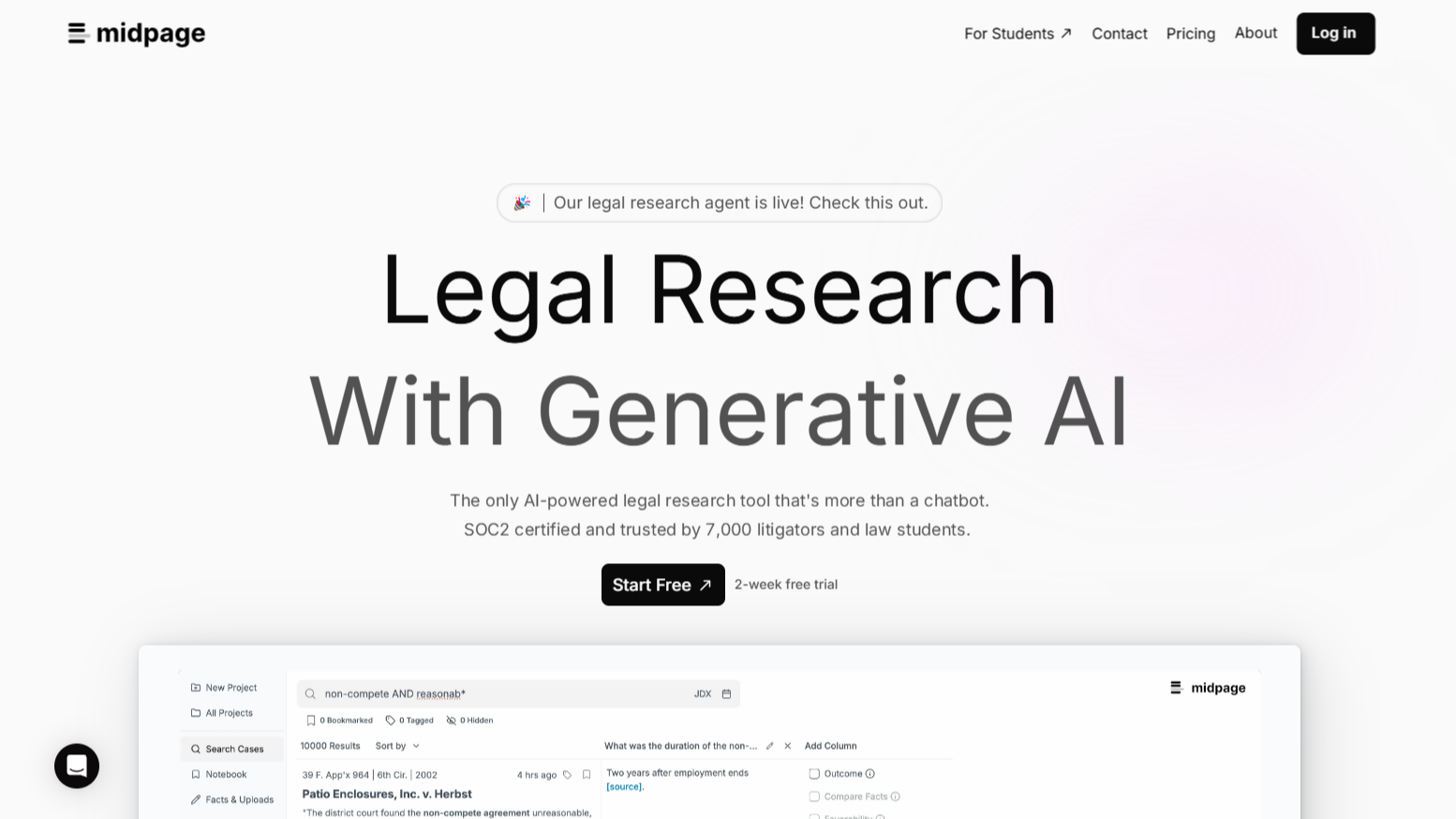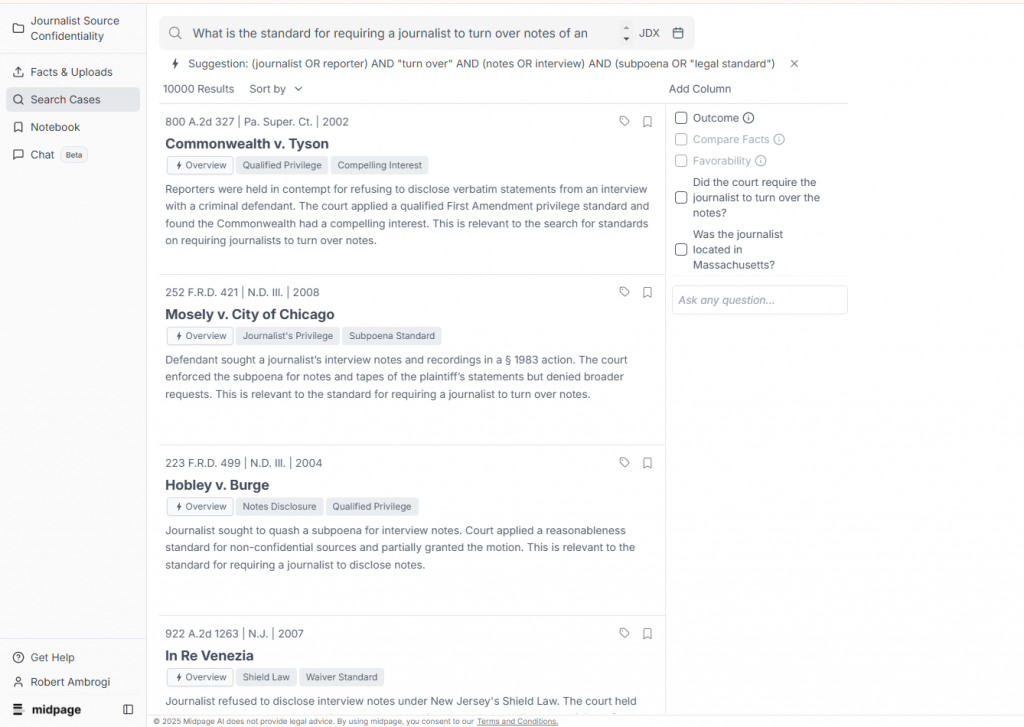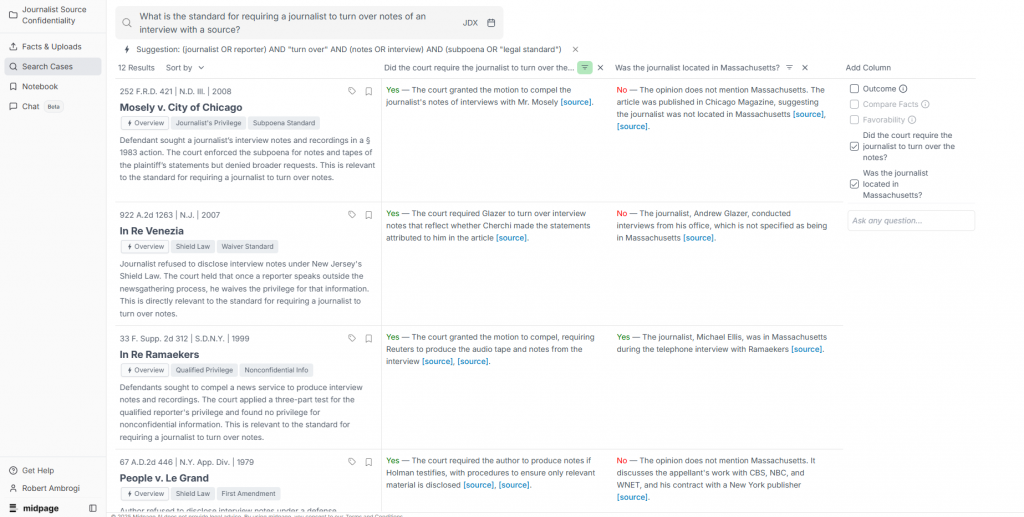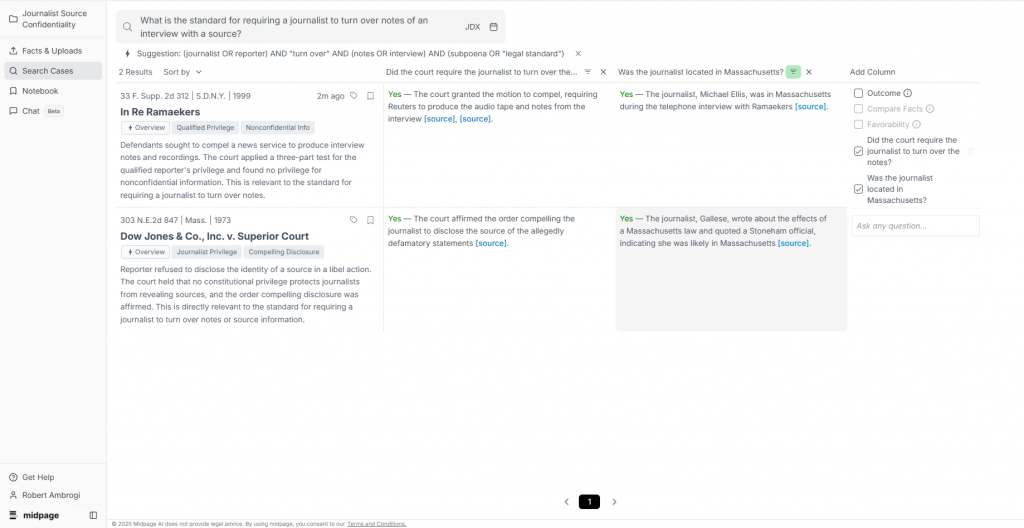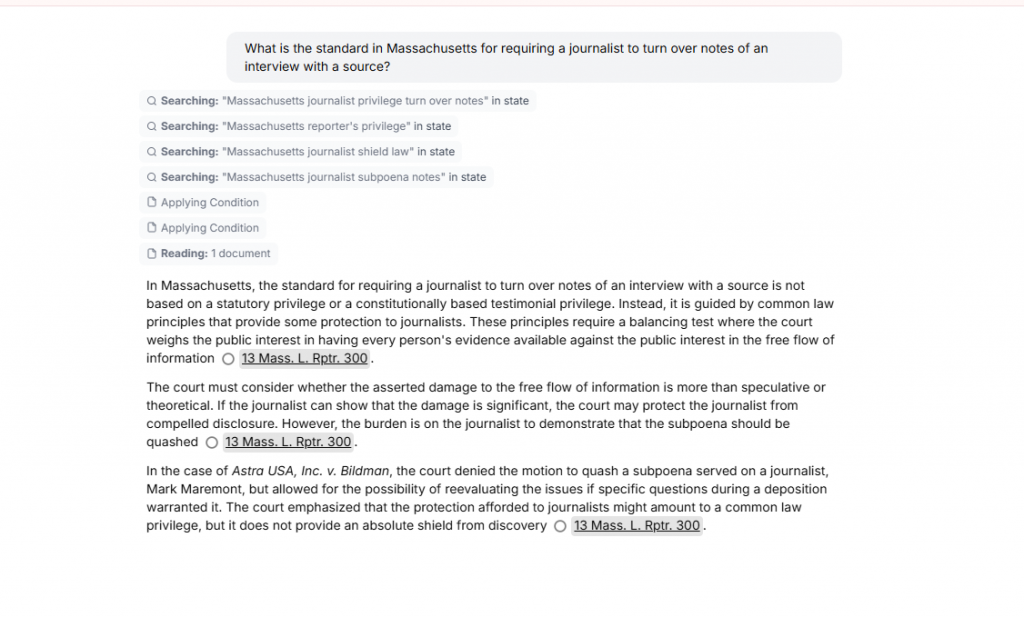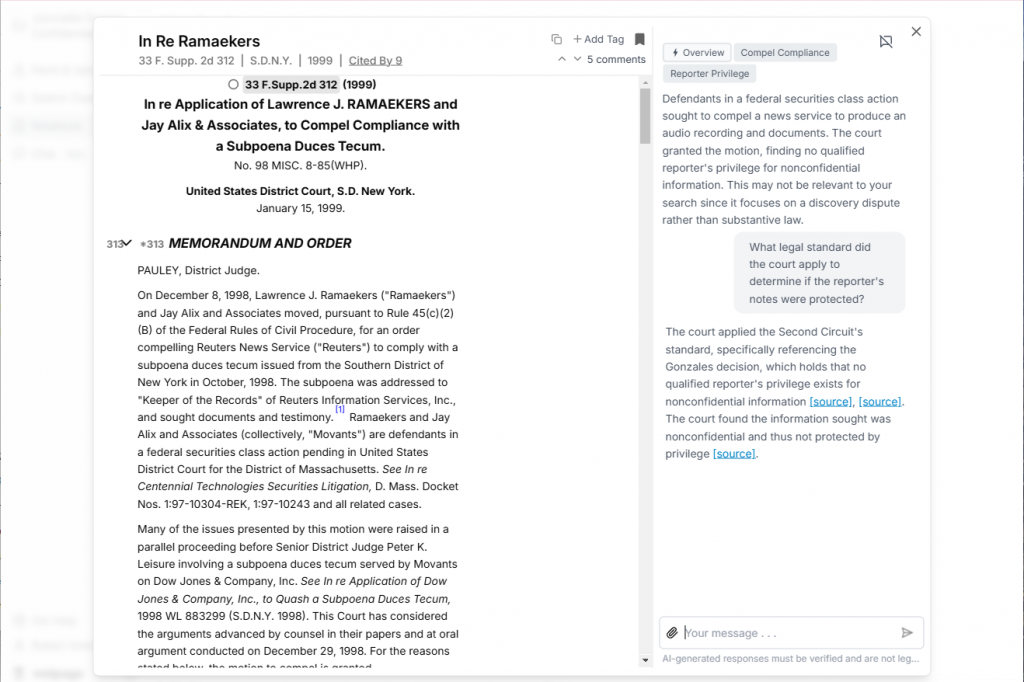Legal research startup Midpage has reached a critical threshold in its commercialization, its founder believes, as it achieves full data coverage of key U.S. case law and prepares to launch its own citator in the coming weeks.
The company, which has spent two years building its own comprehensive case law database, is positioning itself to compete more directly with established legal research providers by combining traditional research capabilities with innovative AI-driven features for analyzing and navigating cases.
Founded two years ago with $1 million in venture funding, followed by a second $1 million raise last year, Midpage is focused exclusively on building a legal research platform that leverages AI to help lawyers more efficiently find and analyze relevant resources.
The company recently achieved what it considers full data coverage of U.S. case law, including all federal appellate and trial cases and state appellate cases, putting it on par with major competitors in terms of case law content. (It does not have state trial court cases.)
“Unlike all the Word plugin contract startups or all the Harveys of the world, we’re focused on case law,” said Otto Zastrow, Midpage’s founder, in a recent interview. “This is obviously a huge challenge because, while you can do great things with AI and case law, you first have to create this large dataset to even be able to take part in the game.”
Building a Case Law Database
Rather than licensing case law from established providers such as Fastcase, Midpage made the decision to build its own case law database, largely from scratch. Starting with publicly available data from sources such as Court Listener, the company has worked to fill gaps in coverage and improve the quality of the data with the goal of matching established legal research providers.
Zastrow said the company reached a major threshold in December in building its database, hitting more than 10 million cases that cover what he describes as “everything that is important.” The current database includes all federal appellate cases, federal civil trial court cases, and state appellate cases.
The main gaps in coverage are federal district court criminal cases and state trial courts, though Zastrow notes that state trial court opinions are not typically considered essential for most legal research.
AI-Powered Research Features
What sets Midpage apart from traditional legal research platforms is its approach to helping lawyers navigate and analyze case law. The platform combines conventional Boolean search capabilities with AI-powered features that allow users to quickly analyze and narrow search results across multiple dimensions.
One of the platform’s most unique features – one I have never seen on another legal research platform – is the ability to create customized grids or columns of search results where each column represents a specific question about the cases that helps narrow the results.
Anyone can try Midpage free for two weeks, so I did just that. I started my research session by entering the query, “What is the standard for requiring a journalist to turn over notes of an interview with a source”?
Note in the image above that, when I entered that query, Midpage suggested a Boolean rephrasing of the query, presumably to help me get more targeted results. I stuck with my query, rather than accept the Boolean suggestion, and it produced the list of cases you see above. (I did later try the Boolean suggestion, and it delivered a slightly different set of results.)
In the results list, note the “Add Column” option to the right. There, I can use one of the suggested prompts or ask any question of my own and it will create a new column showing the responses for each case. I can do this repeatedly, with each response creating a new column, and each new column helping me narrow the results and better evaluate whether the case is on point for what I am researching.
I added the question, “Did the court require the journalist to turn over the notes.” Midpage has an option to make this a yes/no question, which I selected. It then answered the question for each case, and I was able to then filter the cases by only those for which the answer was yes.
I then asked another question, “Was the journalist located in Massachusetts?” Again, Midpage created another column, and again, because I made this a yes/no question, I was able to select only those cases in which the journalist was in Massachusetts.
As you can see, using these columns, I was able to find only the cases in which the court ordered the notes to be turned over and in which the journalist was located in Massachusetts.
When Keywords Don’t Suffice
Zastrow showed me an example search involving non-compete agreements. He started with a traditional Boolean search, “non complete AND enforce*,” retrieving more than 10,000 results.
To narrow those results, he added a column in which he asked, “What is the geographic coverage of the non-compete?” A column appeared next to the original results with an AI-generated description for each case of the non-compete’s geographic coverage.
Then, because he was interested only in non-competes with a duration of 10 months or less, he added a third column asking the yes/no question, “Was the duration of the non-compete under 10 months?” The AI filled out the column, answering yes or no for each case. He could then filter the column to show only those cases that had a yes answer.
“How would you use a keyword search to say less than 10 months?” Zastrow pointed out. “That doesn’t really work.”
When you then view one of the cases, Midpage knows the questions you have asked and what you were searching for, so it will highlight those parts of the case that are related. The user can comment anywhere on a case and save both cases and the in-line comments to research notebooks.
Tailor Your Research To Your Facts
Midpage also includes a feature that allows users to input facts or upload documents pertaining to the matter they are researching, and it can use those inputs to provide more targeted and relevant search results.
You can also use the Add Column feature to compare facts between your matter and the cases in the search result, or to predict whether a case is favorable or not to your position in a matter.
All of this gets saved into project folders – the cases, the searches, the columns, notes you’ve added – and it can all be exported.
The company also recently launched an AI agent that allows users to ask questions and get direct answers, much like the AI assistants in Lexis+ AI and Westlaw now do.
While both of those other companies’ chat assistants have come under criticism for sometimes giving wrong answers, Zastrow is confident that the Midpage assistant is much better at giving correct answers.
In the example you see above, I asked, “What is the standard in Massachusetts for requiring a journalist to turn over notes of an interview with a source?”
You can also engage chat while viewing a case to ask questions about the case, as shown here.
New Citator Launch
Last year, I wrote a post about new citators launched by legal research companies Paxton and vLex in which I described the development of a reliable citator as the holy grail of a legal research company.
Reflecting that, Zastrow believes that his company’s imminent launch of a citator service represents a significant milestone. The company developed the citator using AI to analyze case relationships and subsequent treatment. Zastrow says it achieves accuracy levels comparable to established services such as Shepard’s from LexisNexis and and KeyCite from Westlaw.
Vanderbilt Law School will be conducting an independent review of the citator’s accuracy, comparing it to existing commercial services, he said.
“We want to do a more independent review where they show that this is as good as or comparable to Lexis’s and Westlaw’s citators, which is really important because if you don’t have some stamp of approval from somewhere, how is anybody supposed to know if it’s good enough,” Zastrow said. “We actually think that it is really good, so we want to actually get proof of that and share it with the world.”
Market Growth
Until recently, Midpage’s customer base primarily consisted of solo practitioners and small law firms who were early adopters willing to use the platform alongside traditional research services. With the achievement of full case law coverage and the upcoming citator launch, the company is now preparing to target medium and large law firms.
The company has begun generating revenue in the past four months, going from zero to “six-figure annual revenue,” according to Zastrow. Having previously raised $2 million in two funding rounds, the company is now preparing for another fundraising round.
Zastrow comes from a technology background, having previously founded a robotics company. Before starting Midpage, he spent two years researching language models, particularly focusing on retrieval-powered language models that can look up information within large databases before answering questions. The company uses OpenAI’s models with some fine-tuning based on their own examples.
Future Development
Within the next few weeks, Midpage plans to release coverage of statutes and regulations, in addition to case law. (The statutes are already available in the agent.) The company is also developing a Word plugin that will integrate its case law agent directly into the document drafting process.
Zastrow believes that the future of legal research and writing tools lies in the integration of research and drafting capabilities. “You can’t do drafting without doing research really well,” he said. “The best drafting tools will be the ones that really bring research and drafting into the same tool and the same workflow.”
The company is also participating in an upcoming independent evaluation by the benchmarking company Vals AI, working with Legaltech Hub and Vanderbilt Law School, which will compare various AI-powered legal research tools.
Midpage offers a free two-week trial of its platform, after which the subscription cost is $99 a month. Law students can subscribe for $10 a month.
 Robert Ambrogi Blog
Robert Ambrogi Blog